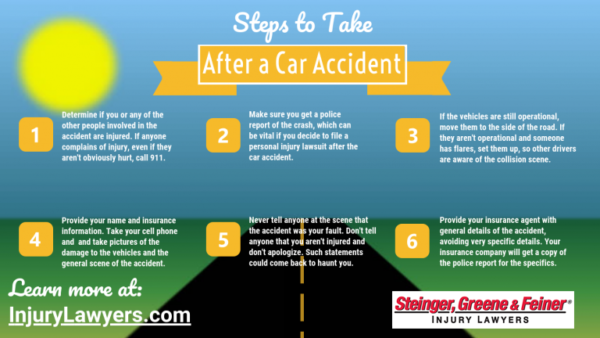No matter how careful you are when you are driving your car or how attentive you are to the behaviors of other drivers, accidents happen. If you are involved in a collision, you may experience a rush of adrenaline and be left dazed, shocked and confused. It can be difficult to take the right steps following an accident, because your brain isn’t quite ready to deal with the process of taking steps — it’s still reeling from what just happened.
The first thing you really need to do following an accident is to take a few deep breaths. As you inhale, push your belly out and let it fall back to natural position as you exhale. Take as many of these deep breaths as you need in order to calm your body and mind. Deep breaths will help your brain complete a sort of reset and enable you to start taking the next steps.
TAKE STOCK
Determine if you or any of the other people involved in the accident are injured. If anyone complains of injury, even if they aren’t obviously hurt, call 911. Emergency services will respond and treat those who require medical intervention. If no one is injured, call the non-emergency police number if you know it. You can also still call 911. The police should be summoned even in minor accidents. Leaving the scene of an accident is considered a crime, and you don’t want to add anything more to your plate.
One of the benefits of calling the police is that you will have a detailed report of the crash for your insurance company. This will be especially important if you weren’t at fault. In a case where the police can’t or won’t respond, you will want to go to the police department to fill out a crash report.
Many people are under the misconception that all vehicles have to remain exactly where they are after a crash. This isn’t true. If the vehicles are still operational, it is actually advised to move them to the side of the road. If they aren’t operational and someone has flares, set them up, so other drivers are aware of the collision scene before they are too close to stop safely. If any of the vehicles involved are on fire or leaking fluids, have everyone get a safe distance away from the accident.
DOCUMENTATION
Depending on the state you live in, exactly how much information you are expected to provide the other driver involved in your accident varies. Typically, you need to provide at least your name and insurance information. Take your cell phone and snap a photo of the other person’s insurance card, and take pictures of the damage to the vehicles.
Don’t forget to take pictures of the scene of the accident. You can take photos of the current weather, the conditions of the road and the exact location of the accident. You may not need these pictures but you might— it won’t hurt to have them. If you have your insurance company’s app, you might be able to document your crash and send it right to your agent, so take a second to look for it.
Never tell anyone at the scene that the accident was your fault. Don’t tell anyone that you aren’t injured and don’t apologize. Any of these statements or utterances could come back to haunt you if you decide to file a personal injury lawsuit later. If you don’t believe you are injured and don’t want medical treatment, tell responders that you don’t need treatment “at this time.” That way, no one can say you claimed to be unhurt.
CONTACT YOUR INSURANCE AGENT
The next thing you need to do is to call your insurance agent and report the accident. Provide the insurance agent with general details of the accident, avoiding very specific details. Your insurance company will get a copy of the police report for the specifics. If you speak with the other driver’s insurance company, remember that you aren’t required to provide any details of the accident. In fact, you aren’t required by law to answer any questions at all. The other agent may try to trip you up, especially if the accident was their client’s fault.
CALL AN ATTORNEY
If you have been involved in an accident, you may decide to file a personal injury lawsuit. You may be entitled to compensation from the at-fault party if you have sustained injuries and incurred medical bills as a result. You can certainly file a lawsuit on your own, but you have a much better chance of being successful if you have an experienced attorney on your side.
A personal injury attorney will be able to gather evidence on your behalf and help you hold the person responsible for your accident accountable for their actions. Most attorneys who specialize in personal injury offer free consultations, so you have nothing to lose by at least speaking to one and seeking legal advice pertinent to your situation.
If you have been involved in a car accident in Fort Lauderdale and need assistance, call our office. Our team of personal injury attorneys is here for you during this difficult time. We will review the details of your accident and help you determine what steps to take next. Call today to schedule your free case evaluation, and discover more about how we can help you.

